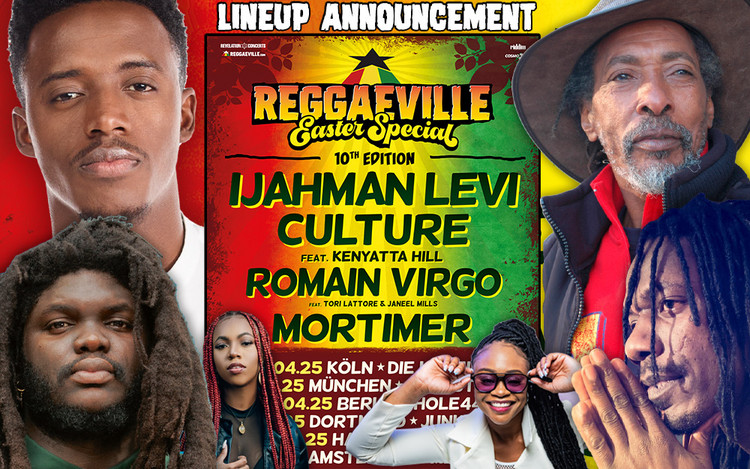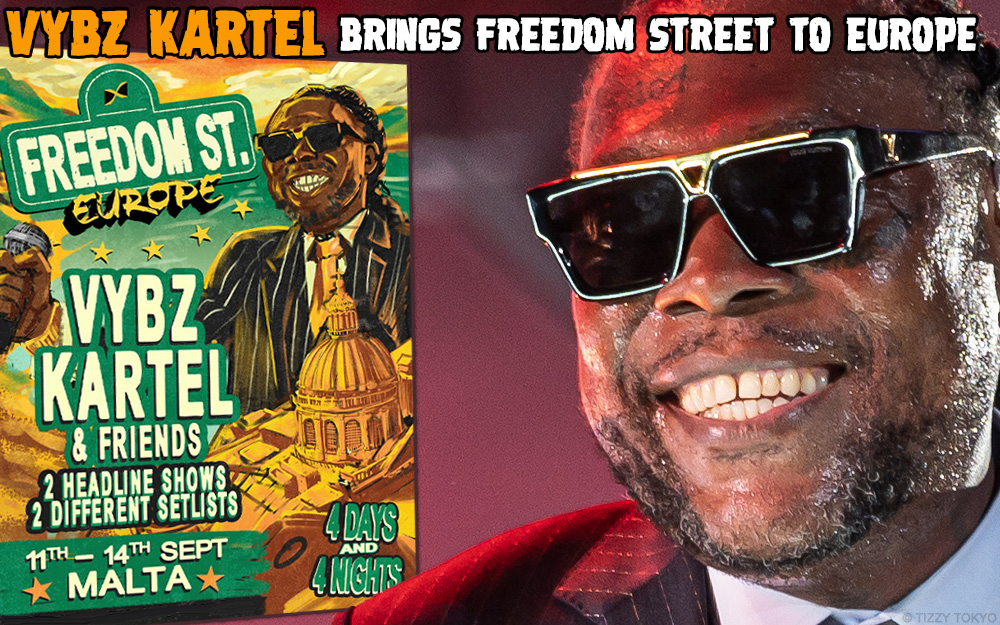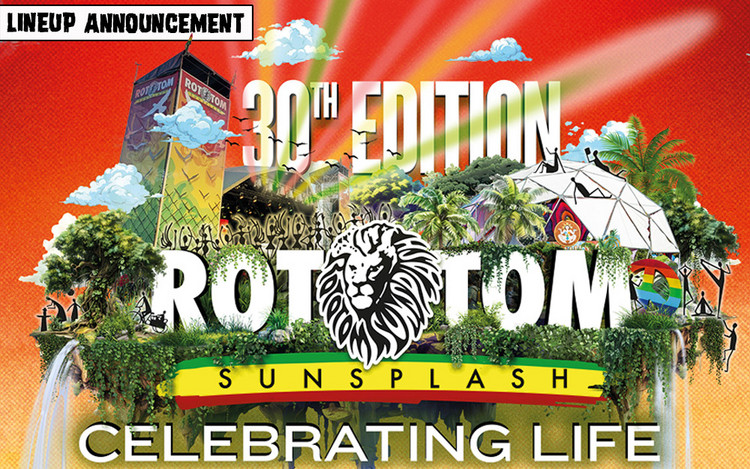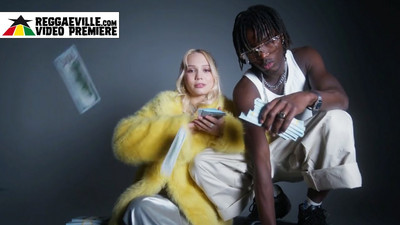Morgan Heritage ADD
Interview with Mojo Morgan from Morgan Heritage
06/18/2015 by Angus Taylor
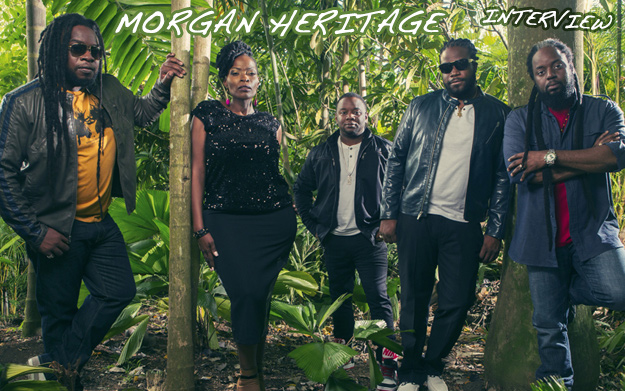
The five family members of Morgan Heritage are back with their tenth studio album Strictly Roots.
Their second long-playing record since their hiatus, Strictly Roots is their first venture on their own Cool To Be Conscious Music label.
Angus Taylor spoke to Mojo Morgan while the group were in Germany rolling the out their release across Europe following its earlier April issue in the USA.
Your new album Strictly Roots was originally planned to be an EP. Was it a very fluid process to change to an album while making it?
It was a very easy decision. When we put the EP together we knew which five songs we wanted to bring to the public and we had the intention to come with an album around six months later – sort of like what we did with The Return and then Here Come The Kings in 2012 and 2013 when we came back on the scene. But seeing that this was our first release on our label CTBC Music Group, it just didn’t feel right and the music made it an even more difficult decision because we had enough songs to do two albums. So we were like “Let’s go big or go home!”
How did you start your own Cool To Be Conscious Music label?
When we came back with The Return we saw the shift in the industry where it’s now about the business of doing music. Artists out of Jamaica were very passionate about the music but sometimes the business gets neglected. So as we zoned in on the business a lot of different things came to the surface and we realised a lot of the new generation of kids listening to reggae music are cool – and the new cool is being conscious. You don’t have to be religious to be conscious. So that’s how we came up with the name CTBC – Cool To Be Conscious Music Group.
What was behind the decision to move on from VP Records? Was it just the right time?
Definitely, and we had their full support. Much respect to Randy and Chris Chin. They were like our professors over the last fifteen years of our career and at this point it was now time to implement what we’ve learned and see what else we could do and what else we could incorporate that we weren’t doing with VP. So it was taking on the challenge of engaging with consumers in ways we haven’t done before – such as creating our own app that you can download on Android or Apple devices in the respective app stores. These are the things we are able to do – not just as independent recording artists but as an independent record label. We’re able to navigate the waters in ways we weren’t able to before because we were just recording artists on someone else’s label.
Is the decision to start your own label comparable to the decision to go off and do solo projects and the decision to come back together? Are you all very sensitive to when the time is right for things to change? Sometimes it’s just paying attention to what’s going on in the marketplace. When we took our breaks to spend time with our families, being that we’re musicians, the solo projects came to life. They’re still alive now, even though we’re back together as Morgan Heritage, touring consecutively, releasing new music. Because even when we were doing the solo projects we were still doing one off shows as Morgan Heritage here and there. There was no break!
Sometimes it’s just paying attention to what’s going on in the marketplace. When we took our breaks to spend time with our families, being that we’re musicians, the solo projects came to life. They’re still alive now, even though we’re back together as Morgan Heritage, touring consecutively, releasing new music. Because even when we were doing the solo projects we were still doing one off shows as Morgan Heritage here and there. There was no break!
It’s a very international album with lots of international guests from Europe the USA and Jamaica. How come you decided to stagger the release by putting it out in the USA first?
Well we wanted to make sure that the impact that we needed to have with the album happens the way it was supposed to happen and the only way to do that was by giving Europe a little bit more time to put the presentation together. You have to remember Europe is multiple countries where America is one country.
Increasingly TV and film studios are moving away from staggered territorial release dates due to concerns over piracy. Weren’t you worried that the album might be susceptible to piracy in Europe?
No that’s not really a concern for us because we’ve taken the steps to make sure that our music isn’t all over the internet.
Many younger artists are moving away from releasing albums in favour of EPs. Did you feel confident that with so much experience of the business of music you could succeed with a full album in this climate?
Madonna is still the biggest earner in music and she released an EP a few months ago. So that goes to show you that it’s more about where the business is right now as a whole versus your years of experience within the business. Right now it’s a singles driven market. Consumers are more buying songs and not buying albums which is the most encouraging aspect of this album for us as far as bringing it to the public. We’re selling a lot of albums and it’s very gratifying – we’re very grateful for the outpouring of support from our fans and new fans alike.
You recorded a lot of this album, on the move in your mobile studio – are there any tunes where you listen back to that were recorded in memorable places?
I would have to say the digital bonus track featuring Shaggy, Keep On Jammin is the most memorable for us. This song was recorded in a mini hallway in between the dining room and the bathroom in our home in New York! (laughs) We closed the bathroom door, put up a blanket over the opening to the mini hallway, hung a mic from the ceiling and Peter did that in one take!
So were you walking from the bathroom to the dining room down the hallway when you were suddenly hit by inspiration? Are you often inspired en route to somewhere?
When we travel, for some reason, being that our music is life music, we just see things a different way. The news is not the same because it’s not the same recycled bit every two to four hours. You’re interacting with people from different walks of life. You see really amazing things when you’re travelling, so many different characters that run across your path. We find it easy to translate what we see into our music.
The album title is Strictly Roots but it has lots of other kinds of music on it like Dubstep or what Americans call EDM. So the is the “roots” in the title as much about reggae having roots in other music rather than a purist thing? We like to look at the roots in two ways when we speak of Strictly Roots. The roots is about where you’re from as an individual, what you represent – because everything in life has a root. And then musically for us, when you think of the root, it’s not just reggae music or roots music. Every genre has a root. The good thing for us as Jamaican recording artists our music has now transcended to overseas. And like you said about dubstep – you can hear it’s inspired by traditional reggae dub or what we call the version where you have all the delays and the effects and take out the vocals. That’s the foundation of dubstep. So as reggae artists it was important for us to embrace our offspring so to speak.
We like to look at the roots in two ways when we speak of Strictly Roots. The roots is about where you’re from as an individual, what you represent – because everything in life has a root. And then musically for us, when you think of the root, it’s not just reggae music or roots music. Every genre has a root. The good thing for us as Jamaican recording artists our music has now transcended to overseas. And like you said about dubstep – you can hear it’s inspired by traditional reggae dub or what we call the version where you have all the delays and the effects and take out the vocals. That’s the foundation of dubstep. So as reggae artists it was important for us to embrace our offspring so to speak.
You also do that by having an artist like Jo Mersa on the track. It’s about embracing the next generation.
Very much so. You hear Jo Mersa Marley and Jemere Morgan the son of Gramps Morgan and people like Chronixx – the future of the music. People like J Boog, another soldier representing reggae from another part of the world that’s not Jamaica – Tonga, Hawaii, Samoa and the Polynesian islands. You have Rebelution and SOJA from the United States but they tour globally. Then you have the great Shaggy – this album is very universal. That’s the way we like to term it.
A few years ago there was concern in the Jamaican media about foreign artists taking reggae away from Jamaica. But just as you have incorporated foreign musical styles like rock, R&B, rap and pop you yourselves seem to embrace reggae’s international appeal. You’ve also said that the onus is on the artists in Jamaica to understand the business more.
It’s about the growth of the music. It’s like saying Europe is taking away hip hop from America or Atlanta took away rap music from New York. That’s bullshit! There’s no taking away. The music growing. It’s gone beyond being a music that comes from a little island in the Caribbean called Jamaica to a music that is done by people all over the globe – whether it’s Africa, Asia, Europe, other Caribbean islands, South America, the United States, the South Pacific. You go to all these places where reggae artists have been touring for years and influencing generations of activists and people of sound mind that stand for something. This is the history of reggae music. Now this music has taken hold of the flesh of people within these different countries that we’ve been touring for decades – and we don’t embrace it? For me that’s a mistake. We have to sing the praise and speak of the people that are carrying this torch called reggae music – at a time when Jamaican reggae artists can’t even get the documents needed to travel. What’s behind that? Are VISA regulations too strict or is it more on the artists’ side?
What’s behind that? Are VISA regulations too strict or is it more on the artists’ side?
(pauses) There’s different reasons why it’s becoming difficult for Jamaican artists to travel. I think a lot of it comes back to our focus as recording artists. I think we’re focusing on the wrong elements within society that have now become a normal part of pop culture and even a normal part of societies around the world for that matter. I think we should focus more on the positive message in our music and in the realities that we express. The gunman lyrics and the ghetto life - these are all parts of our reality. That’s why we don’t talk bad about dancehall because being born in the ghettos in Brooklyn we have an appreciation for the storytelling that a Bounty Killer or a Mavado would bring to the table when they say “Gunshot fi bust or we no skin no teeth round here”. We’ve lived it being from the ghetto so we understand it. But there has to be balance and sometimes the lack of balance within the music leads to people not getting the permit to travel. Different misunderstandings because of cultural differences.
Speaking of misunderstandings what was your view on the criticism of Obama by Chronixx? The disproportionate outcry in Jamaica vs the blasé response from America. Being from the USA and Jamaica you must be a unique position to assess this? Should a reggae artist criticise the president?
Reggae music is the people’s music. Reggae music is like your daily newspaper. So we cannot be surprised by Chronixx doing that. It’s nothing new. When Peter Tosh said “bun down Buckingham Palace” – how is that any different from Chronixx criticising the president of the United States. There is no difference. So being that we’re students of the music we are not surprised. It wasn’t like “Oh, what is Chronixx doing???” That doesn’t really have an effect on our view of him as a person or as a recording artist. It’s his personal choice. It’s his freedom of expression and America being the land of the free I don’t think they’re going to make that shake them. They have bigger fish to fry than Chronixx speaking ill of their president.
Do you think Obama has been a good president? He’s had a lot to deal with since the USA is currently under the spotlight over police brutality.
Well I don’t really get into politics but I can tell you that the gas prices are down, the construction is up and people are spending money. So all those things lead to the signs of a good economy right? So the proof is in the pudding. It took him eight years but he did it. He brought things back around for people when it was hard in 2008. So that’s my opinion.
We’ve discussed the need to understand the business and economics a lot in this interview. Should your next big project be a Morgan Heritage school of business in reggae where you could pass on what you learned to youths coming up?
I think what we have to do is work with other artists through our label CTBC Music Group to share our view of the business with them. Because I don’t think we are greater than anyone else in the music business – I just think we see things and we want things executed in a certain way so now we have the ability to do that we would love to see more artists do that. Sort of like when Suge Knight, Puff Daddy, Irv Gotti, Cash Money and these guys from the late 90s really took hip hop to another stratosphere, where now you listen to Katy Perry’s new album, take off her vocals and that sounds like a track that TI should be rapping on. That’s because these guys, they really weren’t depending on Sony or Warner to get their music to the people. They really took their destiny in their own hands and I think that’s where reggae music is now.
Tell us about the Catch A Fire US Tour that you are embarking on later this year with the Marleys and Tarrus Riley. Marley and Morgan have been family for a few decades now. It precedes us, when my father Denroy Morgan went to Jamaica with his group the Black Eagles and linked up with Bob Marley & The Wailers. It’s not that we’ve never performed together but we’ve never toured consecutively because it’s something we both desired but our schedules never permitted. So for our father’s and their children to be finally sharing the stage night in and night out – for this now to finally be a reality – I think the fans are excited about it because they’ve been wanting to see it. I think the business is excited about it because you’re getting two of reggae’s best reggae families. When you talk about families there are a few different families within reggae music but I think Marley and Morgan represent two of the best out there right now today and it’s just a great musical experience for reggae fans worldwide.
Marley and Morgan have been family for a few decades now. It precedes us, when my father Denroy Morgan went to Jamaica with his group the Black Eagles and linked up with Bob Marley & The Wailers. It’s not that we’ve never performed together but we’ve never toured consecutively because it’s something we both desired but our schedules never permitted. So for our father’s and their children to be finally sharing the stage night in and night out – for this now to finally be a reality – I think the fans are excited about it because they’ve been wanting to see it. I think the business is excited about it because you’re getting two of reggae’s best reggae families. When you talk about families there are a few different families within reggae music but I think Marley and Morgan represent two of the best out there right now today and it’s just a great musical experience for reggae fans worldwide.
Finally, now that the things you did on your hiatus are more in the background, what do you like to in your spare time when you’re not touring and recording as Morgan Heritage – that you love as much as music?
Watch movies. Catch up on the TV shows. Because here’s the thing – even though we’re from a big family you’d think that we’d want some alone time right? But we like to do those things with our family.
What are the best movies you’ve seen recently? What’s your favourite TV show?
I hope I don’t get in trouble for this… (laughs) but one of the best movies I’ve seen for a long time is CitizenFour the Ed Snowden documentary. That’s one of the best movies I’ve seen recently. It’s awesome. And my best TV show right now is Game Of Thrones.
It makes sense when you paid tribute to Lord Of The Rings with your Return Logo that you might be into that.
Life imitates art and art imitates life. The creative minds in the cinematic world and the movie industry – it’s just brilliant and we’re always intrigued by what they’re going to do next.
It’s not very uplifting viewing though is it? Good doesn’t conquer evil.
The good guy only wins in the movies – but not that movie! Crazy! Very unpredictable. It’s nice sometimes when you can see the creative minds on your TV screen and how it relates to real life.
So are you inspired by other mediums like TV and movies to do certain things in your music?
Definitely. Sometimes the view of the characters on TV and the things they say are very inspiring. I watched the movie [Cry Freedom] where Denzel Washington played Stephen Biko and he said one line to the journalist – and I don’t know if Biko actually said this but it resonated with me – “You don’t choose where you’re from”. And when you listen to the new album Strictly Roots and listen to Wanna Be Loved you can hear that message embodied in the song. Because it doesn’t matter if you’re from the ghetto, it doesn’t matter if you’re from the suburbs, if you’re rich, poor or what your race or nationality is, it doesn’t even matter what your sexual preference is, everyone just wants to be loved. That’s what this album is about.




